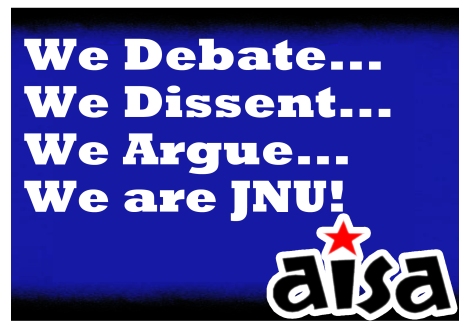We Dissent, We Debate, We Argue, We Are JNU!
Friends,
All India Students’ Association (AISA) welcomes you to JNU- a university where there is no fear and the head is held high! A campus where the minds are open and thinking is alive, where the walls breathe and the classrooms speak. JNU is often called a microcosm of India. A truly ‘Central’ University- JNU is known for inclusion and diversity. The spirit of questioning, the diverse composition, the fearless democratic culture makes JNU what it is- the most vibrant University in India for higher education.
As you proceed to take admission, let us share with you, you are going to be a part of a university that provides the most affordable education in the country. With the lowest tuition and hostel fees, education here is truly what it should be – a right of everyone, not a sellable commodity. When from World Bank to our governments tell us that education must be bought with money, the student movement here in JNU has fought for years to ensure that the doors to the university is kept open for the most marginalised.
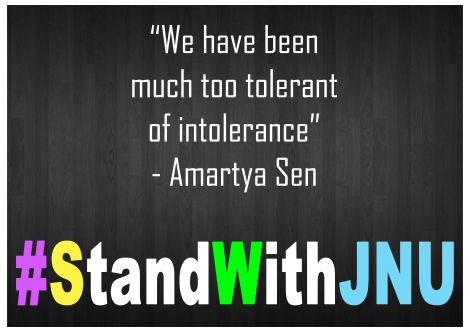 JNU is known for promoting original research and original thinking. In JNU, no theory, no intellectual and no individual is beyond question; and the classroom is a democratic space where knowledge is exchanged and questioning is encouraged. Beyond the classroom, everything from the wall paintings to the fabled dhaba discussions, from the post-dinner public meetings to the street protests, is a source of knowledge. The classroom has no borders. The classroom never ends. The world is our classroom.
JNU is known for promoting original research and original thinking. In JNU, no theory, no intellectual and no individual is beyond question; and the classroom is a democratic space where knowledge is exchanged and questioning is encouraged. Beyond the classroom, everything from the wall paintings to the fabled dhaba discussions, from the post-dinner public meetings to the street protests, is a source of knowledge. The classroom has no borders. The classroom never ends. The world is our classroom.
Why they want to ‘Shut Down JNU’; and why we say ‘Fight Back JNU’
The basic tenet of science is to question, and JNU’s progressive student politics strives to keep the spirit of inquiry alive. It is this spirit of inquiry which has led the conservative Central government to launch a massive crackdown on JNU. The government has displayed its hatred for dissent early on. The attack on JNU is not new. In November, 2015 when the JNU campus was at the peak of the Occupy UGC movement (against cut in fellowships), the RSS mouthpiece, Panchjanya, ran a cover story on JNU, attacking JNU for the inclusion of “human rights, women’s rights, religious freedom, discrimination and exclusion, sexual justice and secularism” in the JNU curriculum. It said that academic centres like the Centre for the Study of Discrimination and Exclusion, Centre for Women’s Studies and North East India Studies Programme have been set up as part of a Left-wing “conspiracy”. The article described student activism and pamphlets and wall posters on “secularism, minority rights, human rights, women’s rights and the rights of deprived sections of society” as “poison.” This is a clear expression of right-wing hate and fear towards all that JNU stands for. This was also done to delegitimise our demand for increased fellowship. The murders of Prof. M. M. Kalburghi, Comrade Govind Pansare and rationalist Narendra Dabholkar, point to the dangers of the times that we are living in. In today’s environment of unreason fanned by the people in power, JNU stands out as a voice of reason and courage, speaking out boldly against religious fundamentalism, atrocities on women and other oppressed sections. While every government has faced tough questions from JNU, the present government is particularly hell bent upon crushing any form of dissent and debate. We must together fight to save these basic rights and values that are enshrined in the Constitution of India.
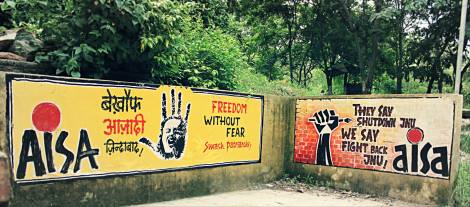 The attack on JNU is not an isolated one. In campus after campus, the present Central government has proved that it stands against the ethos to ask questions, the ability to reason and the values of secularism and social justice. The banning of ‘Ambedkar Periyar Study Circle’ in IIT Madras, the decision to appoint Gajendra Chauhan as the Chairperson of the FTII, the move to scrap Non-NET research fellowships for MPhil and PhD students and the administrative targeting of activists throughout Indian universities- all these attacks have spurred a pan-India movement in defence of campus autonomy, freedom of expression and also in defence of public-funded education itself. A result of the administrative targeting of activists was the institutional murder of Rohith Vemula, a young research scholar of HCU who, along with his friends, was given arbitrary, baseless and unjustified punishments, causing extreme distress to him and ultimately pushing him to suicide.The Ministry of HRD, under Smriti Irani, sent at least five letters to HCU administration, seeking punishment for Rohith and his friends, explicitly favouring the ABVP!
The attack on JNU is not an isolated one. In campus after campus, the present Central government has proved that it stands against the ethos to ask questions, the ability to reason and the values of secularism and social justice. The banning of ‘Ambedkar Periyar Study Circle’ in IIT Madras, the decision to appoint Gajendra Chauhan as the Chairperson of the FTII, the move to scrap Non-NET research fellowships for MPhil and PhD students and the administrative targeting of activists throughout Indian universities- all these attacks have spurred a pan-India movement in defence of campus autonomy, freedom of expression and also in defence of public-funded education itself. A result of the administrative targeting of activists was the institutional murder of Rohith Vemula, a young research scholar of HCU who, along with his friends, was given arbitrary, baseless and unjustified punishments, causing extreme distress to him and ultimately pushing him to suicide.The Ministry of HRD, under Smriti Irani, sent at least five letters to HCU administration, seeking punishment for Rohith and his friends, explicitly favouring the ABVP!
In our own campus, arrests of students under political pressure were made and every attempt was made by the RSS and its student wing, ABVP, to defame our University, its students and teachers. Even till today, the police has not been able to file a chargesheet in the sedition case against JNU students, as the arrests were made on the basis of doctored videos. However, based on this false propaganda, a campaign to “Shut Down JNU” was run by the saffron brigade!
Twin Threat : On the one hand, the government is cutting down spending on top performing educational institutions such as JNU and HCU. On the other hand, key institutions ranging from the Indian Council of Historical Research (ICHR) to NIFT are being filled with people whose only quality is RSS loyalty. On the one hand, the elected government of the country is shamelessly fueling communal discord and, on the other hand, those who speak out against it are being ruthlessly targeted.
Mere Paas Mantri Hai Syndrome
A very crucial feature of the attack on educational institutions is that the ABVP is using the state, police and administrative machinery to harm those students who do not follow the Sangh’s ideology! In HCU, JNU, BHU and other campuses across the country, ABVP has been indulging in an arrogant “Mere Paas Mantri Hai” syndrome, in the confidence that it will receive full and complete support from the Modi government and obedient university administrations. ABVP has attacked public meetings and film screenings on women’s rights, on Ambedkar’s and Bhagat Singh’s thoughts, and against communal violence. ABVP spearheaded the ‘Shut Down JNU’ campaign because the JNU’s democratic inclusive ethos and JNU student movement stand opposed to their communal, casteist and anti-women ideology.
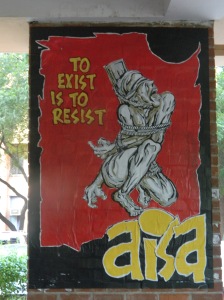 The Governments and their supporters want students and citizens to be obedient, tame workers and consumers. But we believe that the best and most responsible citizens are those who question their Governments and who speak truth to power. We believe that we who study, have a duty to use our learning to make society a better place. That is why JNU must fight back.
The Governments and their supporters want students and citizens to be obedient, tame workers and consumers. But we believe that the best and most responsible citizens are those who question their Governments and who speak truth to power. We believe that we who study, have a duty to use our learning to make society a better place. That is why JNU must fight back.
JNU’s Democratic Legacy
The JNU student movement drafted its own Students’ Union Constitution, and since the very beginning, has conducted its own elections in a democratic manner. The JNU elections are a model of transparency, a rejection of money and muscle power and a celebration of democracy and pluralism.
JNU students braved jail to resist the Emergency – successfully preventing Indira Gandhi from entering JNU during the height of the Emergency.
JNU has been a bastion of resistance against every assault on people’s rights and democracy: against policies of privatization; against the vicious communal Ram Mandir campaign; and against the casteist anti-Mandal agitation and the elitist ‘Youth for Equality’ phenomenon. Although this campus is often termed as ‘Left-dominated’, JNU has valiantly spoken out against civilian atrocities and forced displacement in Singur-Nandigram unleashed by the Left Front government in West Bengal.
When Politics Decides Our Future, Let’s Decide What Our Politics Will Be
As adult citizens, we believe that students have an important role in determining what kind of country, what kind of politics, and what kind of campuses we want. AISA has worked relentlessly for the democratisation of campuses including JNU. Formed in the early 1990’s, AISA represents a radical assertion of students against the commercialisation of education and for social justice and equality. AISA represents a social force dedicated to upholding and furthering the values of gender equality and secularism. AISA in JNU has been distinguished as a credible students’ organisation known for its significant policy-level interventions to democratise the campus over the last 20 years. AISA’s participation in the Students’ Union has meant that the JNUSU represents the concerns of the most marginalised, the most oppressed sections of our society.
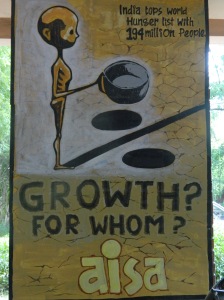 ¨ In the early 1990s, when the ABVP was riding an anti-Mandal, anti-reservation wave of casteism, the JNUSU made significant policy-level interventions that increased admissions of students from deprived backgrounds into JNU.
¨ In the early 1990s, when the ABVP was riding an anti-Mandal, anti-reservation wave of casteism, the JNUSU made significant policy-level interventions that increased admissions of students from deprived backgrounds into JNU.
¨ The JNUSU (1993-94) successfully fought to restore the unique ‘deprivation point’ system in JNU’s admissions, ensuring greater space for women and students who have faced various social deprivations. After OBC reservations replaced caste-based deprivation points, other deprivation points continued and new ones were introduced. So, students from deprived districts; women and transgender students; first generation learners; displaced Kashmiri migrants; wards or widows of defence personnel killed or disabled in service get deprivation points that help them get admission in JNU.
¨ The JNUSU of 1995-96 headed by Comrade Chandrashekhar Prasad led an agitation that defeated a move to privatize JNU and hike fees. As a result, students from very humble economic backgrounds are able to survive in JNU instead of being pushed out by high fees.
¨ The JNUSU in 1995-96 proposed an independent committee to look into sexual harassment complaints– making JNU one of the first institutions to set up the GSCASH in 1999 following Supreme Courts directive.
¨ The JNUSU since the early 1990s also stood with students of AMU, FTII, Jamia Millia Islamia and DU in their fight privatization and fee hikes.
¨ When OBC reservation in academic institutions became a law in 2008, AISA defeated the nefarious plan of faulty “cut-off” criteria to scuttle the reservation through a three-year long legal and political struggle that resulted in a victory won from the Supreme Court in 2011- a verdict of national significance that salvaged and defended OBC reservations across the country.
¨ JNUSU’s struggle ensured that students with Madarsa certificates could join JNU from 2008, putting an end to a decades-old discriminatory practice against students from Madarsa backgrounds.
¨ Historic Reversal of ‘Delinking’ and Restoration of the Integrated BA-MA in SL: AISA-led JNUSU in 2013-14 fought a protracted battle to defeat the move to ‘delink’ BA-MA programme in School of Languages, through series of protests and a historic Students’ Referendum (7 Oct 2013). At the same time that we were fighting against Delinking in JNU, we also fought back FYUP in Delhi University- building humungous pressure through a Referendum in which more than 13,000 students participated.
¨ During 2013-14, AISA-led JNUSU ensured the opening of library round-the-clock, worked towards building an open access JNU Press and built consistent pressure for a Barrier Free Campus for students with disabilities.
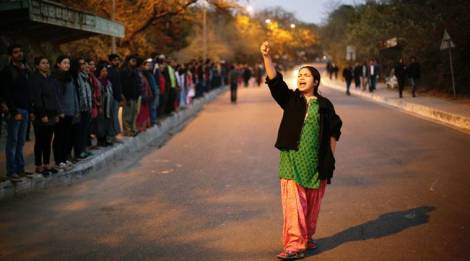
¨ This year too, a massive student upsurge foiled JNU administration’s vicious game plan to scuttle social justice. Spirited student protests forced the admin to retract the move to tamper with OBC reservation and reduction in deprivation points. We unitedly fought to ensure relaxation for OBC candidates in both levels of admission, firstly, a relaxation in the minimum eligibility criteria in the last qualifying exam, and secondly, a relaxation in minimum eligibility marks in the entrance exam. The proposed reductions in gender and regional deprivation points were also reversed, and the cap on total deprivation points were raised for women and transgender candidates from 10 to 12. Further, the protests ensured 27% OBC reservation in hostel allotment. All these policy level changes have further strengthened the university’s socially inclusive character.
It must be mentioned that these inclusive policies are not gifts from the Administration. Student movements have fought and won inclusive policies to benefit poor and socially deprived students. The concern for the oppressed sections of society comes organically to us, as AISA, despite all the limitations of being a students’ organisation, connects to movements throughout the country.
In 2004, we visited Manipur during the massive upsurge in the aftermath of Manorama Devi’s custodial rape and murder to support the anti-AFSPA movement and Irom Sharmila’s struggle.
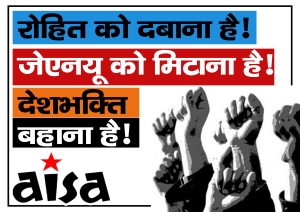 In 2004-05, students defeated a move to introduce a Nestle outlet and corporatize dhaba spaces, defending the rights of small shop owners and dhabas on campus.
In 2004-05, students defeated a move to introduce a Nestle outlet and corporatize dhaba spaces, defending the rights of small shop owners and dhabas on campus.
We led a historic movement in 2006-2007 for ensuring workers’ rights and minimum wages in JNU. Since then, students have continued to support contract workers of JNU in forming Unions and protesting to end manual scavenging, ensure safety equipment, maternity entitlements and other rights.
In 2006, the JNUSU President visited Kalinganagar in Odisha against massacre of tribals by TATAS. JNUSU and JNU teachers joined Medha Patkar and the Narmada Bachao Andolan activists in a hunger strike by dam-displaced people.
In 2006, the Youth for Equality tried to kindle casteist frenzy against OBC reservations, AISA held a parallel hunger strike for social justice in defence of reservations, which attracted much support and foiled the YFE attempt.
During 2011, in the backdrop of widespread witch-hunt of minorities, fact-finding and solidarity teams visited Malegaon and Azamgarh. In December 2012, JNU students were at the forefront of the anti-rape agitation on the streets of Delhi, demanding ‘Bekhauf Azaadi’ (Fearless Freedom) for women.
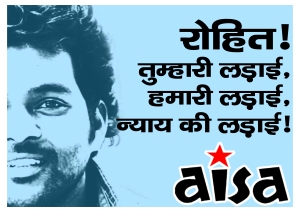 The JNU students also spearheaded the Occupy UGC agitation, against the Modi Government’s cuts in UGC fellowships in higher education, and against the plans to undermine India’s autonomy in higher education at the WTO. Against Government’s all-round attack on educationthrough massive fund-cuts, saffronised appointments and syllabus, CBCS, Central University Bill, RUSA and Lyngdoh, JNU students have always vigorously campaigned throughout the country and led several national mobilizations.
The JNU students also spearheaded the Occupy UGC agitation, against the Modi Government’s cuts in UGC fellowships in higher education, and against the plans to undermine India’s autonomy in higher education at the WTO. Against Government’s all-round attack on educationthrough massive fund-cuts, saffronised appointments and syllabus, CBCS, Central University Bill, RUSA and Lyngdoh, JNU students have always vigorously campaigned throughout the country and led several national mobilizations.
Against the organized gameplan of the RSS-BJP brigade to spread communal hate, JNU student movement became one of the powerful voices against communal carnage in Muzaffarnagar in UP, made timely interventions during planned communal riots in Trilokpuri and Bawana in Delhi and protested against serial vandalisation of churches in the city just before Delhi elections. JNU students took to streets in massive numbers against horrific caste and gender atrocities in Badaun and Bhagana, and consistently protested against serial acquittals in cases of Dalit massacres in Laxmanpur-Bathe and Bathanitola.In the wake of gruesome violence on people from the North-East in Delhi, we firmly stood in solidarity with the North-East students in their struggle against racism. We have consistently fought against the right-wing moral policing, against criminalization of homosexuality.
In the present context of concerted attacks on universities and muzzling of voices of dissent, corporate loot and communal hate,AISA has undertaken a nation-wide movement “Utho Mere Desh– Naye Bharat Ke Wastey, Bhagat Singh Ambedkar Ke Rastey”. One of the key demands of the movement is the enactment of Rohith Act for ending caste based discriminations in campuses.
We invite you to engage with JNU’s vibrant democratic culture and AISA’s campaigns, ask tough questions and join the movement for a better campus, a better India and better world. Let us unite to defeat all regressive ideologies and religious fundamentalism. Let’s unite to uproot caste and patriarchy. Let’s not accept the ever-widening inequalities in our society. When politics decides our future, let’s decide what our politics will be.
